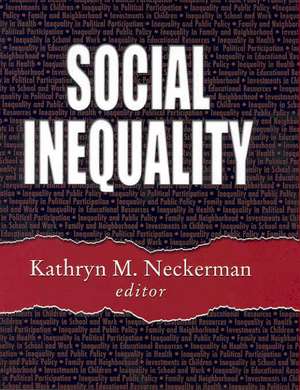Social Inequality
Editat de Kathryn Neckermanen Limba Engleză Paperback – 17 iun 2004
Inequality in income, earnings, and wealth has risen dramatically in the United States over the past three decades. Most research into this issue has focused on the causes—global trade, new technology, and economic policy—rather than the consequences of inequality. In Social Inequality, a group of the nation's leading social scientists opens a wide-ranging inquiry into the social implications of rising economic inequality. Beginning with a critical evaluation of the existing research, they assess whether the recent run-up in economic inequality has been accompanied by rising inequality in social domains such as the quality of family and neighborhood life, equal access to education and health care, job satisfaction, and political participation. Marcia Meyers and colleagues find that many low-income mothers cannot afford market-based child care, which contributes to inequality both at the present time—by reducing maternal employment and family income—and through the long-term consequences of informal or low-quality care on children's educational achievement. At the other end of the educational spectrum, Thomas Kane links the growing inequality in college attendance to rising tuition and cuts in financial aid. Neil Fligstein and Taek-Jin Shin show how both job security and job satisfaction have decreased for low-wage workers compared with their higher-paid counterparts. Those who fall behind economically may also suffer diminished access to essential social resources like health care. John Mullahy, Stephanie Robert, and Barbara Wolfe discuss why higher inequality may lead to poorer health: wider inequality might mean increased stress-related ailments for the poor, and it might also be associated with public health care policies that favor the privileged. On the political front, Richard Freeman concludes that political participation has become more stratified as incomes have become more unequal. Workers at the bottom of the income scale may simply be too hard-pressed or too demoralized to care about political participation. Social Inequality concludes with a comprehensive section on the methodological problems involved in disentangling the effects of inequality from other economic factors, which will be of great benefit to future investigators. While today's widening inequality may be a temporary episode, the danger is that the current economic divisions may set in motion a self-perpetuating cycle of social disadvantage. The most comprehensive review of this quandary to date, Social Inequality maps out a new agenda for research on inequality in America with important implications for public policy.
Preț: 266.60 lei
Nou
Puncte Express: 400
Preț estimativ în valută:
51.01€ • 53.41$ • 42.21£
51.01€ • 53.41$ • 42.21£
Carte indisponibilă temporar
Doresc să fiu notificat când acest titlu va fi disponibil:
Se trimite...
Preluare comenzi: 021 569.72.76
Specificații
ISBN-13: 9780871546210
ISBN-10: 0871546213
Pagini: 1043
Dimensiuni: 168 x 235 x 33 mm
Greutate: 1.08 kg
Ediția:New.
Editura: Russell Sage Foundation
Colecția Russell Sage Foundation
ISBN-10: 0871546213
Pagini: 1043
Dimensiuni: 168 x 235 x 33 mm
Greutate: 1.08 kg
Ediția:New.
Editura: Russell Sage Foundation
Colecția Russell Sage Foundation
Notă biografică
KATHRYN NECKERMAN is associate director of the Institute for Social and Economic Research and Policy, Columbia University.
Cuprins
Foreword xiii Eric Wanner Introduction xvii Kathryn M. Neckerman PART I FAMILY AND NEIGHBORHOOD 1 Chapter 1 The Uneven Spread of Single-Parent Families: What Do We Know? Where Do We Look for Answers? 3 David T. Ellwood and Christopher Jencks Chapter 2 Women's Education and Family Timing: Outcomes and Trends Associated with Age at Marriage and First Birth 79 Steven P Martin Chapter 3 Neighborhoods, Poverty, and Children's Well-Being 119 Anne R. Pebley and Narayan Sastry PART II INVESTMENTS IN CHILDREN 147 Chapter 4 Trends in Children's Attainments and Their Determinants as Family Income Inequality Has Increased 149 Robert Haveman, Gary Sandefur, Barbara Wolfe, and Andrea Voyer Chapter 5 Inequality in Parental Investment in Child-Rearing: Expenditures, Time, and Health 189 Suzanne Bianchi, Philip N. Cohen, Sara Raley, and Kei Nomaguchi PART III INEQUALITY IN SCHOOL AND WORK 221 Chapter 6 Inequality in Early Childhood Education and Care: What Do We Know? 223 Marcia K. Meyers, Dan Rosenbaum, Christopher Ruhm, and Jane Waldfogel Chapter 7 Progress in Schooling 271 Robert M. Hauser Chapter 8 College-Going and Inequality 319 Thomas . Kane Chapter 9 Digital Inequality: From Unequal Access to Differentiated Use 355 Paul DiMaggio, Eszter Hargittai, Coral Celeste, and Steven Shafer Chapter 10 The Shareholder Value Society: A Review of the Changes in Working Conditions and Inequality in the United States, 1976 to 2000 401 Neil Fligstein and Taek-Jin Shin Chapter 11 The Changing Distribution of Education Finance, 1972 to 1997 433 Sean Corcoran, William N. Evans, Jennifer Godwin, Sheila E. Murray, and Robert M. Schwab Chapter 12 School Inequality: What Do We Know? 467 Meredith Phillips and Tiffani Chin PART IV INEQUALITY IN HEALTH 521 Chapter 13 Health, Income, and Inequality 523 John Mullahy, Stephanie Robert, and Barbara Wolfe Chapter 14 The Income-Health Relationship and the Role of Relative Deprivation 545 Christine E. Eibner and William N. Evans Chapter 15 Inequality in Life and Death: What Drives Racial Trends in U.S. Child Death Rates? 569 Janet Currie and V Joseph Hotz PART V INEQUALITY IN POLITICAL PARTICIPATION 633 Chapter 16 Political Equality: What Do We Know About It? 635
